By Cristina Cabrera Jarro -
Photography: MARLENE QUARONI | FC
MIAMI | The annual Migration Mass, marking the feast of the Epiphany and the start of National Migration Week, showcases the variety of languages and dialects, colors and costumes, cuisine and traditions present in South Florida.
The celebration Jan. 7 at St. Mary Cathedral was no different. Participants included natives of China, the Philippines, India, Vietnam, Jamaica, Brazil, Korea, Poland, Haiti, Nigeria, and more.
And as Archbishop Thomas Wenski put it in his homily, the point of the Mass, and the week, is to highlight the unity of all people.
“When Jesus was born as a man in Bethlehem he came not for just one people, but for all peoples, all races, of all time and places,” the archbishop said in his homily.
“It is awesome to see all the different cultures mesh together in one place and praying in their own language,” said John Villaflores, a Filipino parishioner at St. Maximilian Kolbe Church in Pembroke Pines. “Praying the Our Father is especially beautiful because it sounds like we’re all speaking in tongues.”
That positivity stands in contrast to the negativism currently surrounding immigrants in the U.S., as hundreds of thousands � so-called “dreamers” protected by DACA and Haitians and Central Americans with Temporary Protected Status � face the prospect of deportation.
Pope Francis called for the world to speak out on behalf of migrants and refugees when he launched the Share the Journey campaign last September. In that spirit, we share the stories � #ShareJourney � of some of our South Florida neighbors.
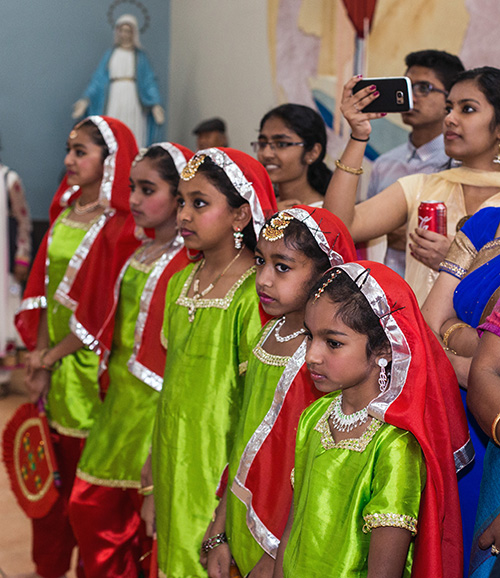
Photographer: MARLENE QUARONI | FC
Young members of the Indian Apostolate prepare to perform an traditional dance at the reception that followed the Migration Mass.
100 Elephants and drums
About 100 Indian guests attended the Migration Mass, with many women dressed in traditional saris and men in kurta pyjamas or suits.
India is a predominantly Hindu nation. But that doesn’t mean that there aren’t Catholics. In fact, one of Jesus’ apostles made it that far east to evangelize: Thomas.
“We have a random portion of Catholics in our country,” said Dixie Shanu, a parishioner at Our Lady of Health, or Velamkanni Matha Church, in Coral Springs.
The church is part of the Syro-Malabar Diocese of Chicago, one of the Eastern rites that make up the universal Church. Our Lady of Health started in 1984 with six families, and was recognized as a mission of the archdiocese in 1986. Today, more than 400 Indian families from all over South Florida worship there.
Parishioner Prety Devasia presented a precious gift during the offertory: a fully adorned elephant. Elephants are considered sacred in the Indian culture. They symbolize intellect, wisdom, divinity, luck and even peace. In the Hindu faith, they are also linked with deities like the Lord Ganesha.
“It is a small replica, but in the southernmost part of India, 100 adorned elephants are out in the streets with their riders, and drums are banging as we celebrate,” Devasia said.
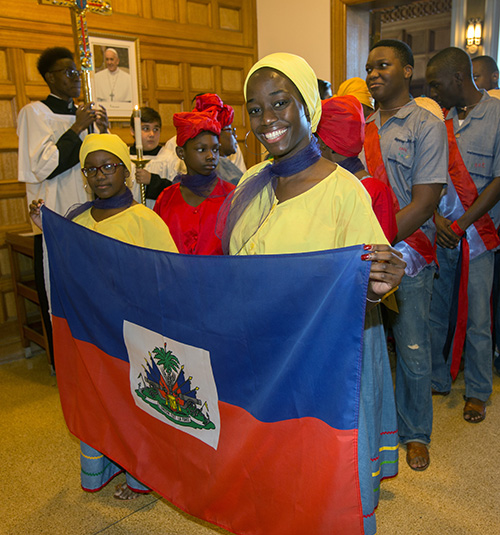
Photographer: MARLENE QUARONI | FC
Laurie Bruno, holding flag in foreground, and other members of the Haitian Apostolate, prepare to walk in the procession at the start of the Mass.
Outfit means unity
The Haitian carabella dress is typically worn by women Jan. 1, Haiti’s Independence Day, and May 18, Haiti’s Flag Day. But the outfit can be worn any day that celebrates Haitian pride.
“This outfit to us means unity,” said Emma Francois, a parishioner at Notre Dame D’Haiti Mission in Miami. “It signifies strength and every time we dress the same way, we feel like there is unity among us.”
Francois broke down the colors of the traditional dress: blue for the sky, yellow for the sun, red for the blood shed on the battlefields, and green for hope. Sharing those details with the younger generations is important.
“The young ones need to know about the culture,” Francois said. “Because they were born here, and were never in Haiti, we need to transfer the culture to them so that when we are not here they will keep the tradition.”
Above all, she wants to remind them to “always fight for liberty, fraternity and equality.”
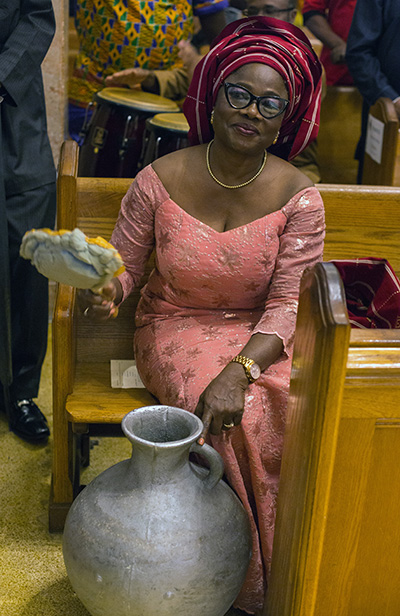
Photographer: MARLENE QUARONI | FC
Oby Okani, of the Nigerian Apostolate, plays a traditional drum at the end of the Migration Mass.
Names tell the story
Nigeria is comprised of numerous states, with people speaking various languages including Hausa, Igbo and Yoruba. Because of the variation, English is the official language of the country, as it was during colonial times.
“A Nigerian living in Miami can say something and a Nigerian living in Broward may not understand,” said Simon Okonor, a parishioner at St. Mary Cathedral in Miami who migrated to the United States 30 years ago in search of higher education.
Though the languages differ, Nigerians can identify where other Nigerians come from by their names, which are often given in praise to God. Timilehin, for example, is Yoruban for “God is with you.” Onyinyechi means “God's gift” in Igbo.
“Every name that is Nigerian has a meaning to it, other than just a given name,” said Irene Okonor, Simon’s wife.
Her advice to fellow immigrants: “Just keep the culture. Preserve your own culture because you don’t want to extinguish it. You want it to remain and be proud of it.”
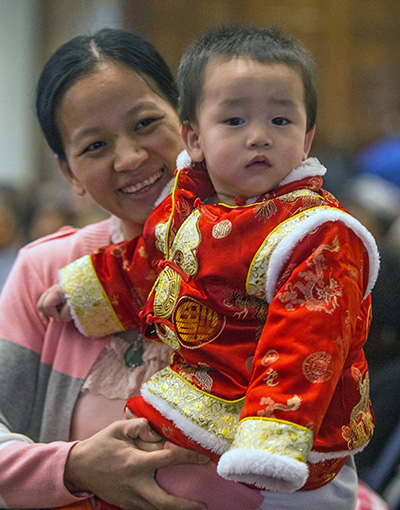
Photographer: MARLENE QUARONI | FC
Jindie Lin of the Chinese Apostolate holds her son, Kenny jiang, 13 months old, during Mass.
Took a chance
Bernadette Chik migrated to the United States with her husband and two sons in 1996, from what she described as an overcrowded Hong Kong. At the time, the government was transitioning from British rule back into the hands of Communist China.
“I wasn’t worried about who was taking over, but it was more so about God being with us wherever we went,” said Chik. “We had a chance to come here, so we came here.”
They could have moved to New York or San Francisco, home to the two largest Chinese communities in the U.S. Instead they chose Miami, where they were definitely a minority. But Chik believed God guided them here, and a few months after they moved, the archdiocese established a Chinese Apostolate.
“Gradually we fought and worked, and every week now there is Chinese Mass,” Chik said. The Masses are celebrated every Sunday at St. Jerome Parish in Fort Lauderdale, and once a month at St. Thomas University, Miami Gardens.
Chik and her family look back now and see themselves as blessed to have established roots in America. But when she sees fellow Chinese immigrants struggling to gain legal status, she recalls the worries of her in-laws.
“They worried because we sold everything in Hong Kong to come here, and then we came, and if we had to be deported we wouldn’t have anything back home either,” said Chik. “We didn’t worry because we thought that if God wanted us to come here and stay, we would find a way.”
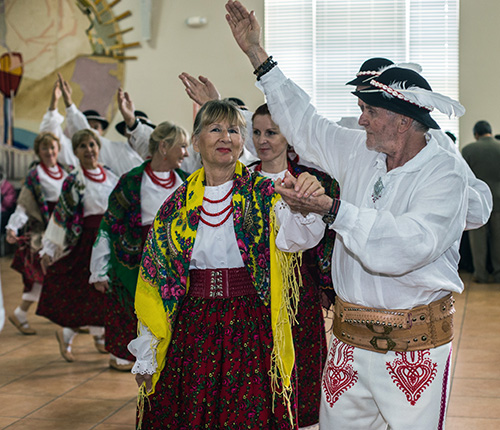
Photographer: MARLENE QUARONI | FC
Members of the Polish Apostolate dance the Polonez at reception after Mass.
‘Blessed’ in Polish
"Beata" means blessed in Polish. It’s the given name of Beata Redlicki, a parishioner at Our Lady of Czestochowa Polish Mission in Pompano Beach.
“I am blessed for the opportunity to meet so many different, wonderful people,” she said of her attendance at the Migration Mass. “To know different cultures, to see different kinds of food, and to see different kinds of entertainment. It’s really wonderful that we can integrate with each other.”
January 2018 marked 27 years since she migrated to Chicago for a job as a physical therapist. Her two sons were born there, and because of their talents playing tennis, the family moved to Boca Raton.
At the cultural celebration that followed the Migration Mass, she helped distribute plates filled with kielbasa, bread, potato salad and Polish donuts (all donated by Krakus Deli and Euro Deli, or cooked by members of the Polish mission). She also shared a few jokes and stereotypes, courtesy of her sons, about growing up Polish.
“It’s along the lines of ‘You need to drink hot soup,’ even when it’s a hot day in Florida,” Redlicki said. “And one that drove my sons crazy was, “A B-plus is terrible.”
Redlicki believes those above-average educational standards pushed her sons into UCLA and Duke. She takes pride in the fact that they also speak, write and read Polish fluently. They maintain their culture by celebrating a Polish Christmas, a Polish Easter and attending Polish church services.
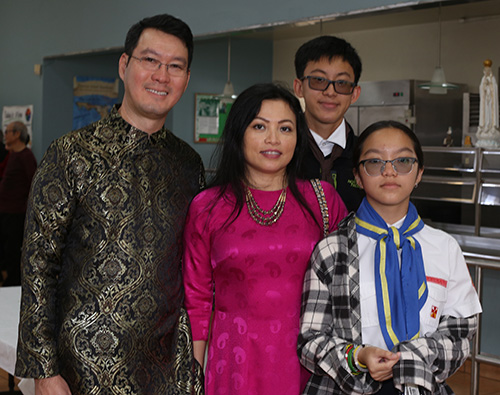
Photographer: MARLENE QUARONI | FC
Khoa Mguyem poses with his family at the reception that followed the Migration Mass: wife Doan, son Kenneth and daughter Lindsey.
Escaped communism
Khoa Mguyem left his home in Vietnam in 1988. He escaped by boat and lived in Thailand for almost two years. In 1990, he was given the opportunity to come to the U.S. and took it, even though it meant leaving his relatives behind.
“We had to adjust in many different ways, from the food to the language. But we tried and we’re very thankful,” Mguyem said.
He now serves in the Vietnamese Apostolate, which meets at Our Lady of La Vang Mission in Hallandale Beach. He teaches Sunday school in Vietnamese because he believes it is a way of preserving their culture.
“In the Vietnamese way we say, ‘If you lose your language, you lose your country,’” Mguyem said.
He stresses to his two U.S.-born children who they are, where they came from, and how blessed they are. “We are thankful for what we have here. It is a gift from God.”
Back for visits
Kevin Kim came to the U.S. from Korea in 1983. He was a 16-year-old starting high school in a foreign country that became his new home. “We left Korea for political reasons and because of my father,” Kim recalled.
Growing up, he realized there weren’t many Koreans in South Florida, especially when compared to New York or Los Angeles. But with the establishment of the Korean Apostolate in the archdiocese in 1984, he witnessed the union and growth of the community.
Recently, Korean companies such as Samsung and Hyundai have established a presence in South Florida, with offices in Doral which serve as a gateway to Latin America. “Sometimes it feels like Miami is not part of the USA,” said Kim, observing the mix and mingle of cultures here. “It’s just a blessing to see a lot of different peoples.”
Kim attends St. Paul Chung Ha Sung Korean Mission in West Park, and manages to retain his Korean culture by maintaining a connection with family back home. For years, he sent his three children to Korea once a year to meet with family, practice the language, and experience the culture.
His daughter recently accepted a job in South Korea in the field of sports medicine. “She is more fluent in the language, and talks more about the culture and her family,” said Kim. “I’m so glad.”
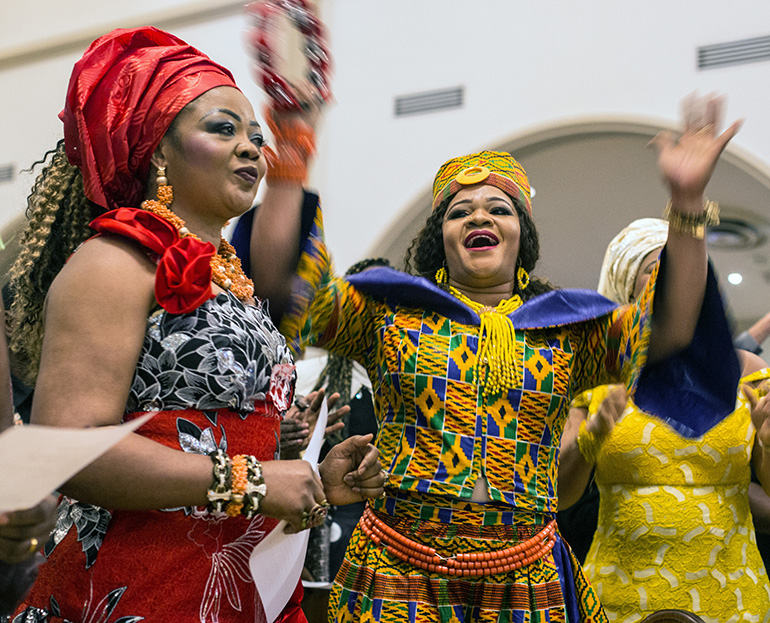
Photographer: MARLENE QUARONI | FC
Stella Madu and Adama Osuji sing a traditional Nigerian song after Mass.
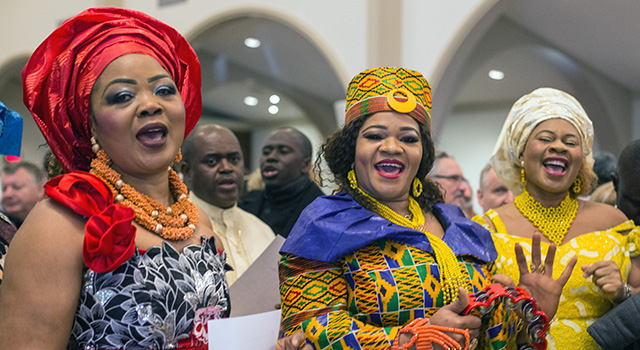
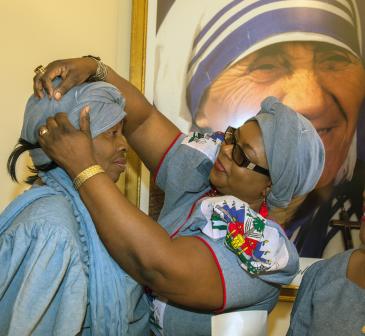
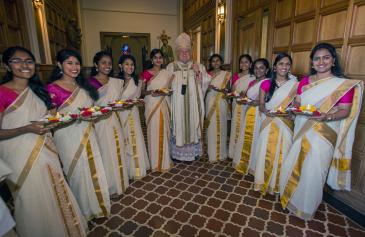
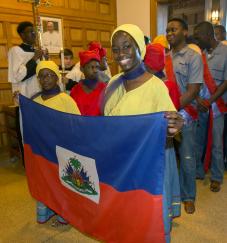
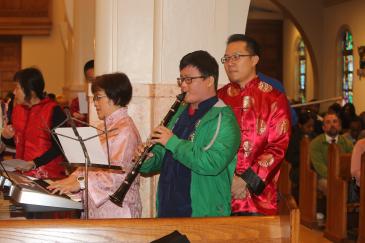
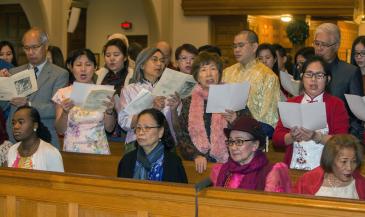
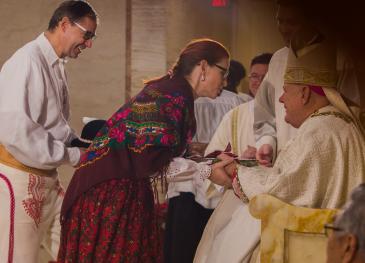
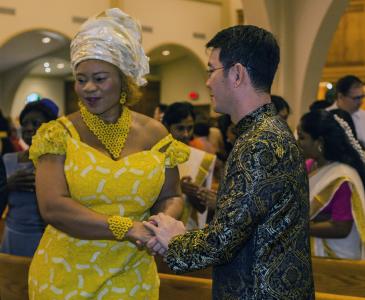
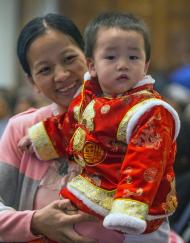
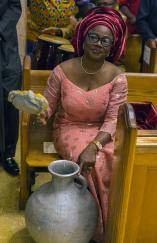
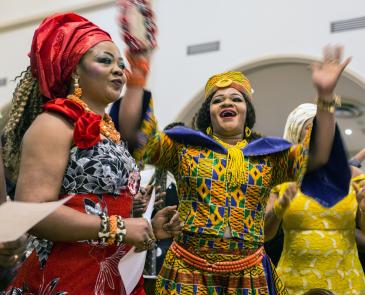
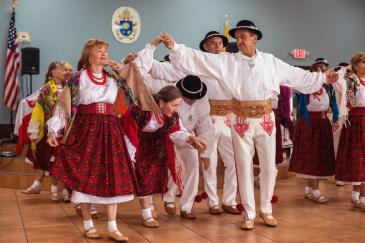
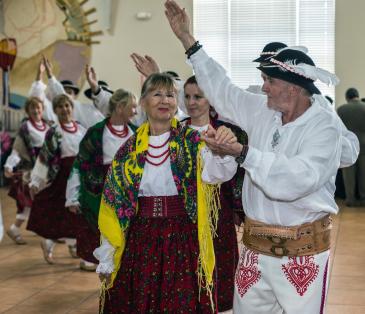
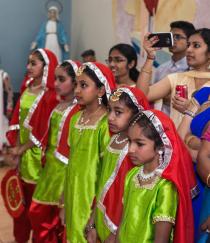
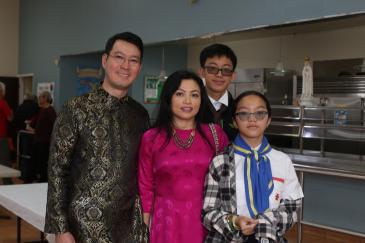
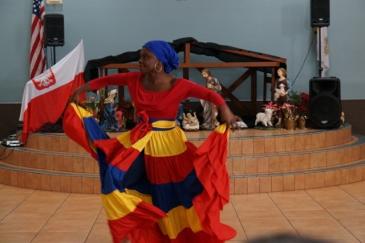
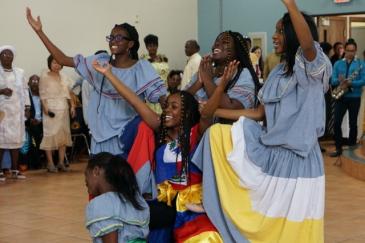

Comments from readers